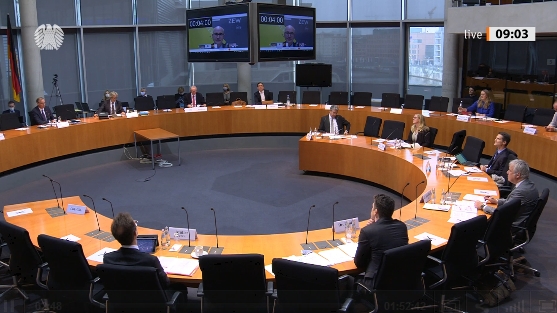
GWB10: The day before
Today, the EU Commission wants to present the plans for the Digital Markets Act, which will give antitrust law completely new instruments – but which must not then be assigned to antitrust law. At the same time, this week the German competition law amendment will be passed in Parliament (or so we expect). And we also have a nice and spicy message on the German Facebook proceedings. Rupprecht Podszun reports.
Post Scriptum (16 Dec 2020): The German Parliament will not decide on the amendment in its session on 17 December 2020, differing from an earlier plan.
The Bundestag listens
The run to a reformed competition act, the Gesetz gegen Wettbewerbsbeschränkungen (GWB), turned into a marathon. In this blog we had leaked the draft in October 2020, which at that time had already been around in Berlin for some time, and it took a few months (thanks to the Ministry of Justice) until it became a proper draft, which then – with a few changes – became the government’s draft, which after the first reading in parliament was referred to the Economic Committee for further discussion. (Yes, if you read to the end, you can still pick up a small certificate in public law from the secretariat.)
On 25 November 2020 the hearing of the experts in the Economic Committee of the Bundestag took place. Invitees were Bundeskartellamt’s Andreas Mundt, Daniela Seeliger (Linklaters), Achim Wambach for the Monopolies Commission, Anselm Rodenhausen (Zalando), car lobbyist Ralf Scheibach, Robby Riedel of the workers union DGB, consumer protection activist Klaus Müller (vzbv) and the author of these lines (D’Kart HHU).
Rodenhausen and Wambach joined in virtually, the rest of us sat – at a distance of course – in the Paul Löbe House of the Bundestag. For the faction from the Rhine area (Mundt, Seeliger, Podszun), personal travel was a matter of honour. After all, shortly before, the fallen Wirecard CEO Markus Braun had tried in vain to avoid a personal journey to another committee in Berlin. He had even appealed to the Federal Supreme Court with this aim. The top criminal court, however, considered the risk of a trip from a South German jail to Berlin to be manageable, “especially since a certain risk of infection is currently part of the general risk of life for the population as a whole” (BGH, 17.11.2020, Case 3 Ars 14/20). We did not regret the trip, according to my information the hearing did not become a superspreader event.
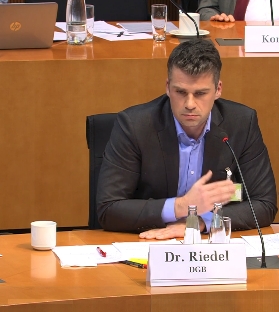
Robby Riedel 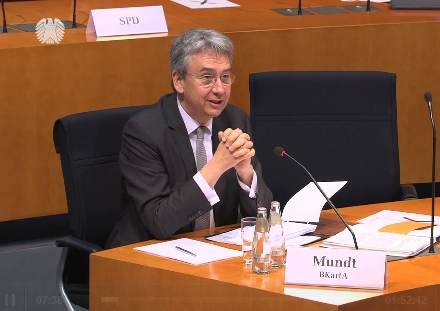
Andreas Mundt 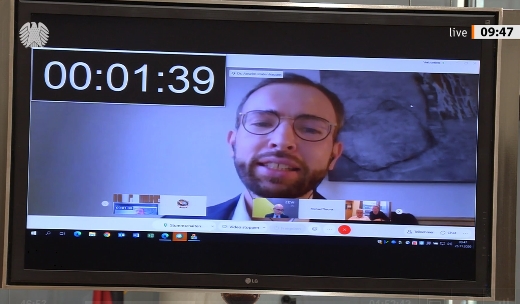
Anselm Rodenhausen 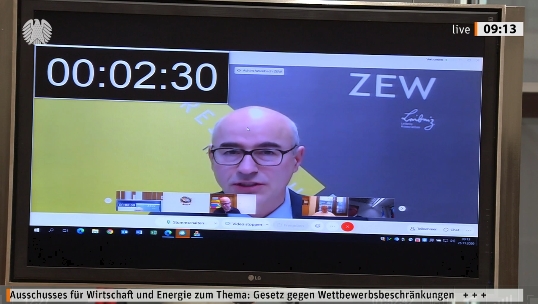
Achim Wambach 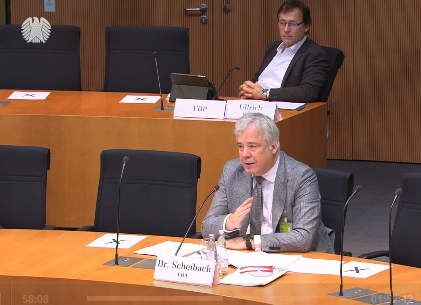
Ralf Scheibach 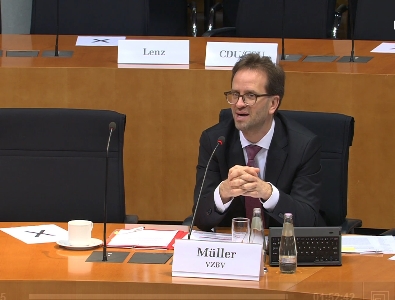
Klaus Müller 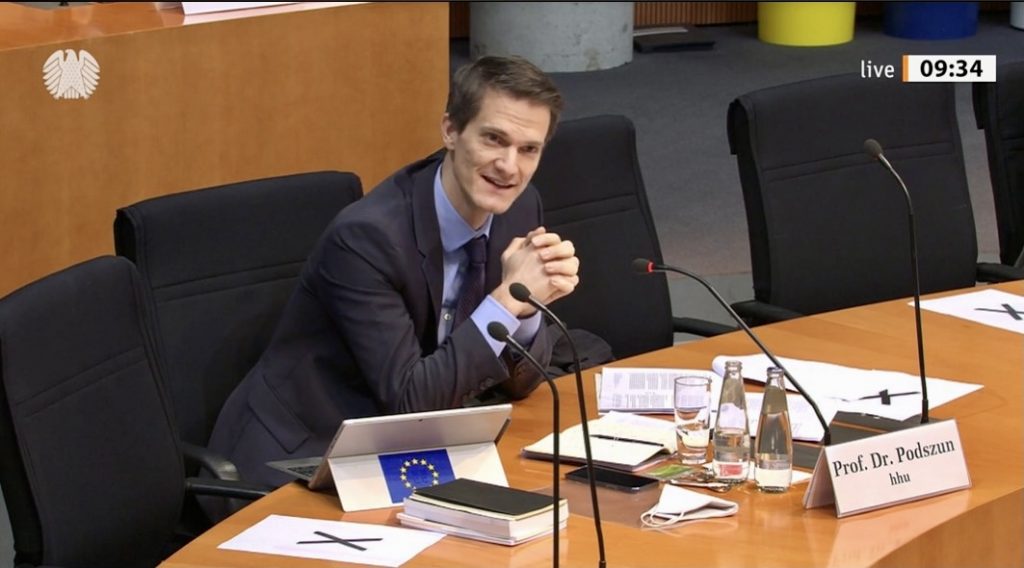
Rupprecht Podszun 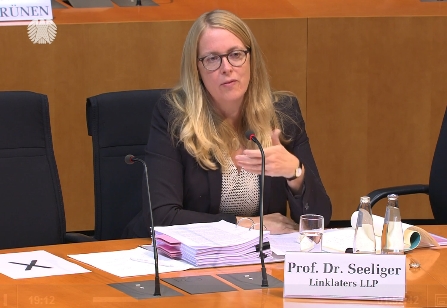
Daniela Seeliger
The new gospel
Instead, the gospel was spread! Contents: New rules for gatekeepers are needed. Over the months, an astonishing coalition was built: the political parties from left to right are in favour of tougher rules for gatekeepers. This is probably the kind of dialectic that W. Adorno and Max Horkheimer could not have thought up better: First Germany shops itself into a coma online, then it turns to criticism of the online giants. (The truth is that Amazon is more successful in Germany than in some other European countries where there are domestic e-commerce providers who can stand up to Amazon).
The fact that I have a certain sensitivity to how opinions on digital regulation develop is due to my personal trauma 2020: Last year, in 2019, I was asked to write the main opinion for the commercial law hearing of Deutscher Juristentag, a traditional, renowned institution, literally “German Jurists’ Day”. They planned to meet in Hamburg in 2020. I received a call from a very distinguished business lawyer asking me whether I could imagine writing such an expert opinion for the Juristentag. The question to be reviewed was: “Is it advisable to introduce tougher rules for online platforms and other digital companies?”
If you are asked by the Juristentag, no is not an option, you rather stammer a yes with joy, because it is a matter of honour. That it is an honour can be seen from the fact that the drafting of the report is done on an honorary basis. Which means: without any renumeration. You are free to come up with your thoughts, these may become the subject of the meeting of that institution, and your professor’s ego is caressed. Now, of course, you work hard on the deadline – as always. For me, this deadline was the end of January, and so, after intense reflection, I submitted 100 pages of expert opinion at the beginning of February with basic principles and proposals for stronger regulation of online platforms. You have no idea what I had to cancel in order to get it all wrapped up. What happened then…
Well, weeks passed. There was a meeting in a nice law firm in Berlin. It was the first time, then, that I saw big signs urging to disinfect hands when entering the office. Further weeks passed. Galley proofs trickled in. The meeting of the association was postponed until 2022 (!). (That’s where the trauma comes from.)
And: The antitrust lawyers radicalised. Lines that seemed risky to me when I submitted them have now become mainstream. Demands that were suspected of socialism at the beginning of 2020 are now being advocated by major law firms. When I submitted my expert opinion (which, by the way, is published here and which is of course not only of historical value), I was still thinking: Will the mostly conservative-liberal lawyers (in a German understanding of liberal), assembling at the Juristentag buy a provision like Section 19a GWB-E from me? An ex ante-regulatory tool for platforms? Meanwhile I ask myself: Will they scold me as timid because I did not immediately demand the break-up of Google and several years of imprisonment for Mark Zuckerberg?
This year has seen the triumph of the progressive antitrust movement, not only in Germany, but also in the USA and – if not everything is deceptive – even in Brussels.
Lobbying

Sometimes I dream that even the GAFAs wish to be regulated, but perhaps I confuse their friendly nature with the content of their lobbying. It is always confusing that Booking and Zalando and Spotify, all of whom are not exactly dwarfs of the platform economy, advocate stricter rules – for the GAFAs of course.
(With the GAFA lobbyists, I simply cannot imagine them tipping a few bottles of beer with a backbencher in Berlin’s Ständige Vertretung bar. Where do they go to in Berlin? Do you meet them in the Monkey Bar, a fancy rooftop location above the zoo? With a G&T?)
The gin would certainly not fail at the price. Lobbycontrol reported in September:
“In the top 30 companies by lobbying expenditure in Brussels, all the tech companies are in the top 30. Google is by far the leader with a lobbying budget of €8 million, followed by Microsoft in second place (€5 million) and Facebook in fifth place (€4.25 million). Only the oil company Shell and the pharmaceutical giant Bayer make it between the tech giants in 3rd and 4th place with more than € 4.295 million lobbying budget. Apple and Amazon are somewhat further down the list in 16th and 23rd place”.
In Berlin, however, the ministry and parliamentarians seem to have been bravely resistant so far. The rules are, in my expectation, tightened rather than watered down. When I speak of “the rules”, I am of course referring to the abuse regulations for digital players.
Making 19a fly!
The questions of the extremely well-prepared parliamentarians in the German Bundestag at the expert hearing primarily related to Section 19a of the draft GWB. Here it is becoming apparent that adjustments are still being made in the final (centi-)metres of the reform process (there had already been a specific proposal circulating in Berlin, but it does not officially exist, it is a so-called non-paper. It is always difficult for people like me, who have not seen every episode of House of Cards, to understand exactly how politics works)
Apparently the DMA initiative of the European Commission, which will be presented to the public on 15 December 2020, has inspired the desire to work on Section 19a GWB-E. (By the way, here you will find a text on the DMA by Thorsten Käseberg from the German Ministry that is worth a read).
In the version presented in the government draft, section 19a GWB-E is open to interpretation. Any term would be the subject of lengthy disputes. The actual aim of the provision, to speed up the proceedings, would thus be missed. As a result, there will be more precise wording and new, more concrete examples of problematic practices. However – and this is a major difference to the idea of “blacklisting” in European law – the Bundeskartellamt will remain at the helm. The rules should not automatically apply ex ante as prohibitive norms, but continue to require an antitrust official to pull the trigger. The somewhat broader “general clauses” are also to be retained, although they are to be made more precise by means of rule examples.
That’s right. Ex ante regulations that apply automatically have advantages, but also disadvantages: they petrify a state of knowledge. The general clauses will make it possible to examine the latest ideas of the norm addressees, even if they are not to be found in a black list or a rule example. It was still open whether the norm addressee’s position will also be further specified – until now it was rather a vague assumption. Sure – you know who is meant, but how do you describe it? You are welcome to recall an obscenity here, e.g. the famous dictum of Justice Potter Stewart in the case of Jacobellis v. Ohio at the US Supreme Court.
Duration of the procedure
Every expert has his favourite subjects. If one had asked Ms Seeliger, she would certainly have made an emotional plea for the recognition of previous compliance measures in the calculation of fines. But not everyone gets their favourite question. (Daniela Seeliger, who has been steeled by the Commission Competition Law 4.0 in such hearings, then put down her plea in the new issue of journal WuW). Mr Rodenhausen of Zalando insisted on time spent on a platform as an important criterion for Section 19a (1). Probably shopping at Zack-Zack-Zalando is faster than in the swirling waters of the Amazon.
Mr Scheibach, the car industry representative, also had a favourite topic. He was the only representative of traditional German industry, which had had a hard time positioning itself in this legislative process. Mr Scheibach was in too much of a splash when it came to data access. The subject haunted him, he admitted, and he had to deal with it again and again. Now, he is concerned that the broad data access claims in sections 19, 20 GWB-E will lead to a “wave of lawsuits” robbing the automobile companies of the gold in data. Mr Scheibach:
“We do not yet have a concrete idea, however, and would like to develop, if necessary, a way of possibly narrowing down sections 19 or 20 in such a way that those who are to be addressed by this bill are addressed.”
Aha, perhaps there is a little misunderstanding here? The GAFAs are dealt with in section 19a. Other new provisions are also supposed to deal with other companies. But the automotive industry need not worry. Neither the GAFAs nor the German carmakers need to give up their data gold unless there is a more efficient procedure for data access claims than going through the authorities. By the time a case has ended with a binding decisions, including the difficult follow-up questions, the data will be historic.
Facebook process: Extraordinary
The problem of lengthy procedures remains. In this respect, there is something extraordinary and exceptionally interesting to report, which has been hinted at in a press release issued by the Bundeskartellamt these days. Facebook has lost the summary proceedings before the German Supreme Court BGH. (Self-preferencing: Actually, Michal Gal interviewed me about this for her students, see here, and I wrote about the decision in GRUR (GRUR 2020, 1268). End of self-preferencing.). As reported, the Bundeskartellamt should now actually be able to enforce its decision. The hearing in the main proceedings before the Düsseldorf Higher Regional Court has been postponed until March. A new twist has now been added to the proceedings, which are rich in spectacular twists and turns:

Facebook has once again filed an urgent motion for suspension of execution. Yes, that’s possible. The order of the BGH does not have any binding legal force. And the Düsseldorf Higher Regional Court, the Senate presided by professor Jürgen Kühnen, has now come up with the following clou: a “hanging order” (as we call it in German). Such a suspension order is used in interim proceedings to secure the status quo until a decision has been made on the urgent application. And for the Senate this means: Since it is not possible to decide on the new interim relief sought by Facebook so quickly, it is first of all necessary that enforcement is suspended until a decision on the new application has been made. The Bundeskartellamt has therefore been stopped again. The parties are now allowed to comment once again and my prognosis, which is probably not too daring, is that no decision on the latest interim application may be taken before the hearing scheduled for March. The Office has already lodged an appeal with the BGH.
If you are wondering if this is really true, I assure you: Yes.
The OLG justifies its view by stating that it first has to examine more closely whether what the BGH has decided is at all lawful. Just as a reminder: The BGH is the higher court, it is the Supreme Court in Germany. Well, it has to stand the test of the lower court, though… I wrote here last time that obedience is not a judicial virtue, and certainly not one of this Senate.
So the Facebook process is dragging on for the time being. In the suspension order of the OLG, the duration of the proceedings is now even a self-fulfilling prophecy: The fact that the suspension order delays the proceedings even further…
“does not have a negative impact, since the Bundeskartellamt’s proceedings have now been ongoing since 2016 and the applicants have been using the objected terms of use for many years.
Here is the soundtrack to this case! I am already looking forward to the next matches like a little boy.
Excitement, fun and games
Other issues raised in the consultation on the new bill: New criteria for merger control, killer acquisitions, exceptions for the media, ministerial authorisation of mergers banned by the Bundeskartellamt. Parliamentarians have a special preference for the latter, and I can say that nothing good has ever come out of this crooked section 42. The once again traumatic experiences of the last few years (you remember, and if not: see here) had led to the fact that people were once again considering raising the hurdles for access to ministerial approval. However, the latest proposals did not really seem consistent.
It became particularly lively at two points: Firstly, Achim Wambach and Andreas Mundt were asked whether the Monopolies Commission should be allowed to inspect ongoing proceedings of the Bundeskartellamt, looking into the files, a wish which the Bundeskartellamt is reluctant to fulfil. You can see how the two protagonists reacted in this recording of the hearing from minute 50.
(Incidentally, you will also find here the applications from the government and political groups as well as the experts’ opinions).
Consumer protection
Secondly, there was an exciting moment towards the end of the hearing. Parliamentarian Falko Mohrs (SPD) asked me where I stood on consumer protection powers for the Bundeskartellamt. As you know, since the 9th amendment of the German act, the German national competition watchdog is allowed to investigate infringements of consumer protection laws, but has no prohibition powers or similar. Since then a team of the Bundeskartellamt headed by Carsten Becker has repeatedly sparked a lot of attention with sector inquiries. Together with Christoph Busch and Frauke Henning-Bodewig, I wrote a (somewhat too) long expert opinion for the Federal Ministry of Economics on the question of enforcement powers and since then I am convinced that a moderate extension of powers makes sense – admittedly in close cooperation with private law enforcement, which works well in Germany under the Unfair Commercial Practices Act (UWG in German).
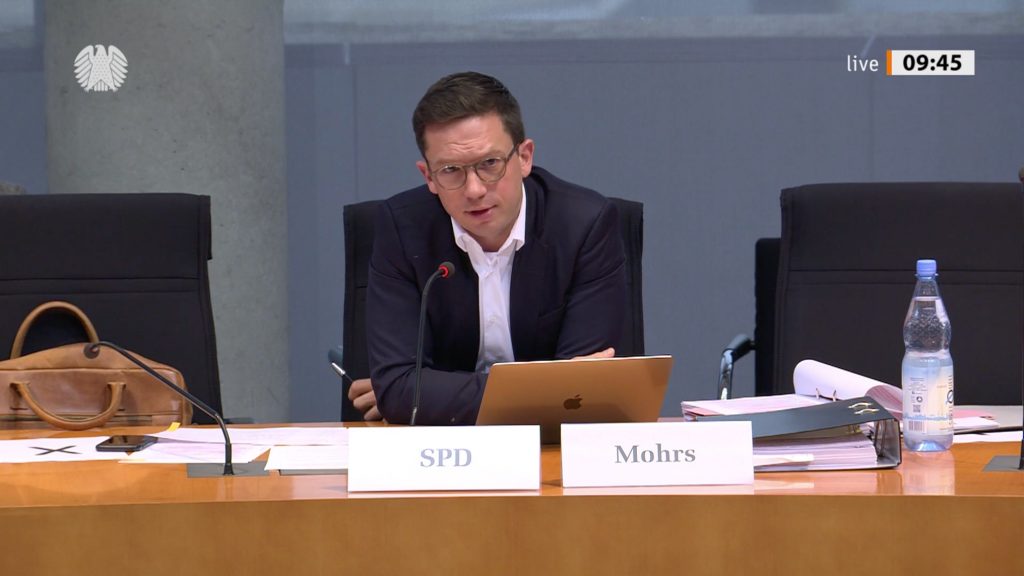
In reply to Mohrs, I argued that the BKartA should be given a little more than it has been given so far, in line with the rest of the European approach to unfair practices enforcement. Katharina Dröge (Greens) then put the same question to Klaus Müller, head of consumer protection in the main German private consumer protection association (Verbraucherzentrale Bundesverband). I was curious: As a consumer protection advocate, it must be a concern of Müller that there is more consumer protection in Germany. An extended toolbox would of course contribute to this. However, the Bundeskartellamt would be a competitor to his consumer organisation. A pike in the carp pond of the enforcement – so far, this basin has mainly been home to private organisations.
How would Müller decide? In favour of more consumer protection? Or protecting his institution? You can see that at 01:46:45.
In its opinion on the government bill, the Bundesrat, the representation of the Länder in Germany, had argued for more consumer protection. In its response, the Federal Government rejected this – like all other wishes of the Bundesrat, by the way.
Who does what?
Mohrs and Dröge, the names of Parliamentarians just mentioned, are household names if you want to follow the political events in competition law. Who that is – in a moment.
If I see it correctly, the Federal Ministry of Economics retains a central role in the parliamentary process of reforming competition laws, but now mainly as a service provider. If you have the reins of action in your hands up to the government draft, you hand it over when it is transferred from the government to parliament and you subordinate yourself to the legislature. (Even before that, however, it is probably ensured that the wishes of the parliamentarians are not overruled).
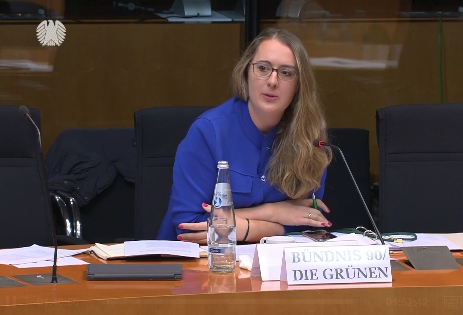
Katharina Dröge 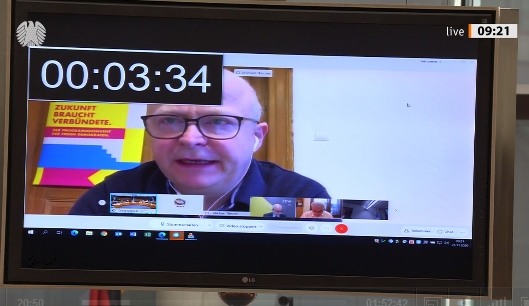
Michael Theurer 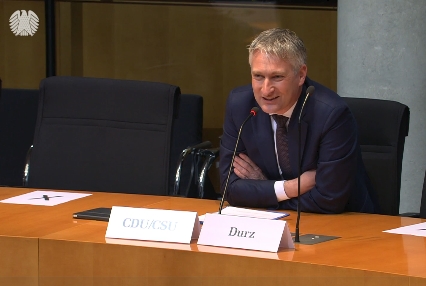
Hansjörg Durz 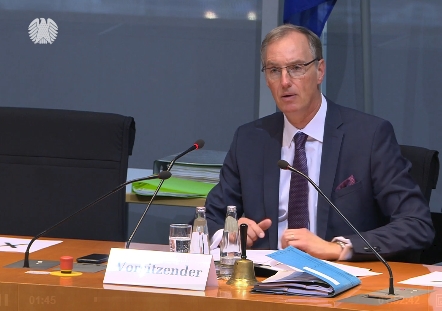
Matthias Heider
Then the rapporteurs of the parliamentary groups who take the bill into their hands and discuss it together will be decisive. Of course, it is primarily the government coalition that is important, as it ultimately brings the majority on the vote. Here, Dr. Matthias Heider (CDU), Hansjörg Durz (CSU) and Falko Mohrs (SPD) are the ones who, together with their assistants, work on substance and wording with very much care. When it comes to legislative technique, references, concrete formulations, or other legal specificities, the Ministry may be asked for advice from time to time. These are the experts. The head of the department, Dr Thorsten Käseberg, was of course also present at the hearing, but – as befits his position – in the second row. The Federal Government was represented by Parliamentary State Secretary Elisabeth Winkelmeier-Becker. Heider, Durz and Mohrs apparently negotiate the changes, and in the end they have to sell it to their parliamentary groups for a majority of votes. They receive suggestions, questions and concerns from their colleagues, on the way. The three parliamentary musketeers of antitrust law are, by the way, toughened – they sat in the Commission Competition Law 4.0.
With a law like this, however, the opposition can also leave its mark, which it has done in this case. With Katharina Dröge (Greens) and Michael Theurer (FDP), two prominent competition experts are available. Dröge has often stimulated the debate on competition policy with her motions. Some of them are mainstream today, but looked radical yesterday. For her conservative counterpart in the CDU, Matthias Heider, this is, by the way, the last amendment he brokers in Parliament: he is leaving the Bundestag of his own free will at the end of the legislative period and wants to work as a lawyer again.
Schedule – and a reading tip
If you are reading this, Margrethe Vestager has probably already announced her plans for the Digital Markets Act. The media will jump on it, the GWB amendment will sail in the slipstream and be passed, while the DMA is still awaiting the fire of the Brussels negotiations. The amendment could now be passed quickly once the parliamentarians have completed their decision-making process. The GWB is item 2 on the agenda of the 99th meeting of the Economic Committee on 16.12.2020, it comes after Corona and before the National Hydrogen Strategy. The very next day, 17.12.2020, the Parliament is scheduled to debate in 2nd and 3rd reading. From 11.20 a.m. the speeches will be broadcast live from the plenary session. It will be a celebration of democracy when the basic law of the market economy is put to the vote! In any case, the ministry and the parliament have been fighting for the right solutions with such expertise and seriousness that all those who dislike politics should have a close look. You can also put sparkling wine, prosecco, champagne or seltzer in the fridge and then do the watching. You can relax in your home office and follow the debate in the Bundestag while you are zooming in on the other screen with your colleagues…
And another tip: Take a look at our – in all modesty – brillant Antitrust AdventCalendar2020! We are on a trip around the world with this blog! Today, we have once again engaged a renowned Head of Agency as our tour guide (not the first, not the last). Like all Advent Calendar guests, we asked her not only about the most important antitrust event in her jurisdiction, but also about a destination for the time after Covid19. Please start dreaming already now!
6 thoughts on “GWB10: The day before”
Die GWB-Novelle ist anscheinend wieder von der Tagesordnung des BT für 17.12. genommen worden. Mal abwarten, wann sie wieder auftaucht; vielleicht ist auch die Meinungsbildung im Ausschuss komplizierter als gedacht.
In der Tat, das ist auch meine Information! Danke für den Hinweis, Herr Zuber. Zu den Gründen können wir derzeit nur spekulieren.